Share
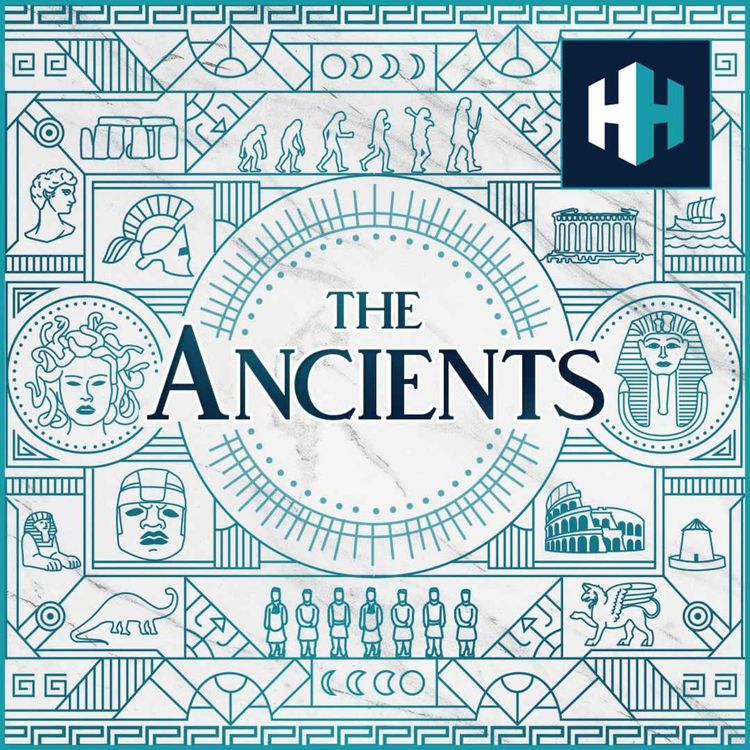
The Ancients
The Roman Legionary
When you picture ancient Roman Soldiers, an image of battle-hardened warriors equipped with iron breastplates, large rectangular shields and mighty helmets will no doubt come to mind. Immortalised in cinematic classics like 'Gladiator' or HBO Period Dramas - the depictions of Roman legionaries tend to all look the same on the surface. But how accurate is this bloodthirsty, armour clad vision - and how did the actual Roman legionaries change across the centuries?
In this episode Tristan welcomes best selling author Ben Kane to the podcast, to delve into the history of the Roman legionaries. Looking at what the clothing, weapons, and archaeology can tell us about legionaries across time (and continent) - who exactly were the Roman legionaries, and how do you separate fact from fiction?
The History Hit Miscellany is published on September 28, but you can pre-order here or visit historyhit.com/book to order from your favourite book shop.
Discover the past on History Hit with ad-free original podcasts and documentaries released weekly presented by world renowned historians like Dan Snow, Suzannah Lipscomb, Lucy Worsley, Matt Lewis, Tristan Hughes and more. Get 50% off your first 3 months with code ANCIENTS. Download the app on your smart TV or in the app store or sign up here.
You can take part in our listener survey here.
Music supplied by All3 Media.
More episodes
View all episodes

639. The Age of Dinosaurs with Henry Gee
01:17:28||Ep. 639Before Tyrannosaurus and Triceratops, Earth was rebuilding from catastrophe. Out of the ashes of the Great Dying rose a new prehistoric world and with it came the age of the dinosaurs.In this episode of The Ancients, Tristan Hughes is joined by Dr Henry Gee to explore the full sweep of dinosaur history, from their emergence on the supercontinent Pangaea to their 150-million-year dominance of the planet. Discover how early reptiles evolved into the giants of the Jurassic and Cretaceous, how ecosystems transformed around them, and why their reign finally came to a dramatic end.MORERise of HumansListen on AppleListen on SpotifyFeathered DinosaursListen on AppleListen on SpotifyPresented by Tristan Hughes. Audio editor and producer is Joseph Knight. The senior producer is Anne-Marie Luff.All music courtesy of Epidemic SoundsThe Ancients is a History Hit podcast.Sign up to History Hit for hundreds of hours of original documentaries, with a new release every week and ad-free podcasts. Sign up at https://www.historyhit.com/subscribe. You can take part in our listener survey here: https://insights.historyhit.com/history-hit-podcast-always-on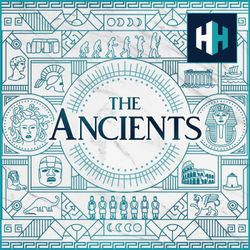
638. Ramesses the Great: Death of a Dynasty
56:33||Ep. 638“Look on my works, ye mighty, and despair.” Ramesses II reigned as Egypt's unchallenged champion for more than sixty years. But within decades the dynasty of Egypt’s greatest pharaoh had fallen apart. Tristan Hughes is joined by Dr Campbell Price to chart how the reign of Ramesses the Great descended into slow collapse. From monumental building projects that once proclaimed eternal power to the advent of instability to the looming threat of the Sea Peoples, discover how Egypt’s New Kingdom began to fracture under the weight of its own success. This is the dramatic final chapter in the story of the House of Ramesses.MOREThe House of Ramesses II: Egypt's Greatest Pharaoh?Listen on AppleListen on SpotifyThe Legend of Osiris: King of the DeadListen on AppleListen on Spotify Watch this episode on our YouTube channel: @TheAncientsPodcastPresented by Tristan Hughes. Audio editor is Aidan Lonergan. The producer is Joseph Knight. The senior producer is Anne-Marie Luff.All music courtesy of Epidemic SoundsThe Ancients is a History Hit podcast.Sign up to History Hit for hundreds of hours of original documentaries, with a new release every week. Sign up at https://www.historyhit.com/subscribe. You can take part in our listener survey here:https://insights.historyhit.com/history-hit-podcast-always-on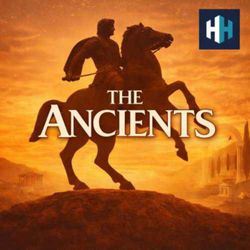
637. Alexander the Great | Lord of Asia
01:16:46||Ep. 637As friendships fracture and old alliances break, Tristan Hughes and Dr Adrian Goldsworthy chronicle the epic downfall of Alexander the Great. Alexander’s relentless campaigns from Bactria to Babylon push his empire, army and inner circle to breaking point, hear the battles, betrayals and decisions that hastened a legendary conqueror’s tragic end.MOREThe Romans and India with William DalrympleListen on AppleListen on SpotifySuccessors of Alexander the GreatListen on AppleListen on SpotifyPresented by Tristan Hughes. Audio editor is Aidan Lonergan and the producer is Joseph Knight. The senior producer is Anne-Marie Luff.All music courtesy of Epidemic SoundsThe Ancients is a History Hit podcast.Sign up to History Hit for hundreds of hours of original documentaries, with a new release every week. Sign up at https://www.historyhit.com/subscribe. You can take part in our listener survey here: https://insights.historyhit.com/history-hit-podcast-always-on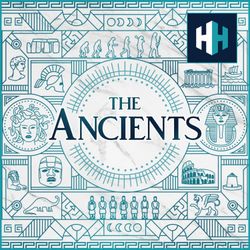
636. The House of Ramesses II: Egypt's Greatest Pharaoh?
58:29||Ep. 636The name of Ramesses the Great is etched deeper into Egypt than almost any other ruler. Colossal statues moulded in his image tower over the Nile. Reliefs of his victories are carved into countless temple walls. But were did Ramesses II come from? And how was this legend of Egyptian history born?In this episode of The Ancients, Tristan Hughes is joined by Dr Campbell Price to uncover the rise of the House of Ramesses and the century of crisis that paved the way for Egypt’s most famous pharaoh. From dynastic turmoil and religious upheaval to military revival and monumental propaganda, discover how Ramesses II seized his moment and shaped a legacy that has endured for over 3,000 years. Was he Egypt’s greatest ruler or its greatest architect of reputation?MOREThe Great SphinxListen on AppleListen on SpotifyThe Pyramids of GizaListen on AppleListen on Spotify Watch this episode on our YouTube channel: @TheAncientsPodcastPresented by Tristan Hughes. Audio editor is Aidan Lonergan. The producer is Joseph Knight. The senior producer is Anne-Marie Luff.All music courtesy of Epidemic SoundsThe Ancients is a History Hit podcast.Sign up to History Hit for hundreds of hours of original documentaries, with a new release every week. Sign up at https://www.historyhit.com/subscribe. You can take part in our listener survey here:https://insights.historyhit.com/history-hit-podcast-always-on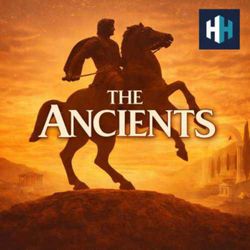
635. The Fall of Persia | Alexander the Great
01:13:44||Ep. 635Tristan Hughes and Dr Adrian Goldsworthy continue the special series on Alexander the Great, delving into the epic sieges of Tyre and Gaza in 332 BC, and Alexander's triumphant campaign through Egypt. They explore the strategic brilliance at the Battle of Gaugamela, the fall of Persepolis, and the eventual demise of Darius III. As Alexander's army pushes further east, tackling internal conspiracies and relentless combat, they traverse the formidable landscapes of Bactria and Afghanistan, capturing Alexander's the blend of military genius, relentless ambition, and the complex legacy of one of history's most formidable commanders.MOREThe Ancient AmazonListen on AppleListen on SpotifyThe Walls of BabylonListen on AppleListen on SpotifyPresented by Tristan Hughes. Audio editor is Aidan Lonergan, the producer is Joseph Knight. The senior producer is Anne-Marie Luff.All music courtesy of Epidemic SoundsThe Ancients is a History Hit podcast.Sign up to History Hit for hundreds of hours of original documentaries, with a new release every week. Sign up at https://www.historyhit.com/subscribe. You can take part in our listener survey here: https://insights.historyhit.com/history-hit-podcast-always-on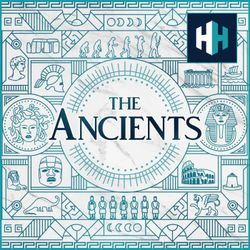
634. The Skulls of Jericho
53:53||Ep. 634In the depths of ancient Jericho, beneath layers of earth dating back 10,000 years, archaeologists uncovered something extraordinary: human skulls cast in plaster, their faces carefully reconstructed and their eyes set with shells. Who were these haunting figures meant to represent?In this episode of The Ancients, Tristan Hughes is joined by archaeologist Raven Todd DaSilva to explore the mysterious plastered skulls of Jericho. Dating to the Neolithic period, these striking objects reveal complex beliefs about memory, identity and the dead in some of the world’s earliest farming communities. How were they made? What did they mean? And why did this unusual practice spread across the Levant? Join us to dive into one of prehistory’s most compelling archaeological discoveries.MOREJericho:Listen on AppleListen on Spotify Origins of the Inuit:Listen on AppleListen on Spotify Watch this episode on our YouTube channel: @TheAncientsPodcastPresented by Tristan Hughes. Audio editor is Aidan Lonergan. The producer is Joseph Knight. The senior producer is Anne-Marie Luff.All music courtesy of Epidemic SoundsThe Ancients is a History Hit podcast.Sign up to History Hit for hundreds of hours of original documentaries, with a new release every week. Sign up at https://www.historyhit.com/subscribe. You can take part in our listener survey here:https://insights.historyhit.com/history-hit-podcast-always-on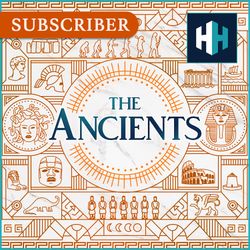
633. After Ancients: Sir Barry Cunliffe
31:45||Ep. 633In this special subscriber episode, we have an exclusive interview with the renowned archaeologist, Sir Barry Cunliffe.Barry shares insights from his extraordinary 50-year career, detailing his early days, notable excavations, including at Fishborne Roman Palace, where a last-minute dig unearthed a significant mosaic, and the challenging excavation of the sacred, but deadly, spring in Bath.Presented by Tristan Hughes. Audio editor is Aidan Lonergan. The producer is Joseph Knight. The senior producer is Anne-Marie Luff.All music courtesy of Epidemic SoundsThe Ancients is a History Hit podcast.Sign up to History Hit for hundreds of hours of original documentaries, with a new release every week. Sign up at https://www.historyhit.com/subscribe. You can take part in our listener survey here:https://insights.historyhit.com/history-hit-podcast-always-on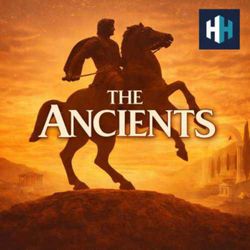
632. The Invasion of Persia | Alexander the Great
01:04:55||Ep. 632In spring 334 BC, a young Macedonian king sets out to conquer the Persian Empire.Tristan Hughes and Dr Adrian Goldsworthy explore Alexander the Great’s early campaigns, from the daring crossing into Asia to incredible victories. They discuss Alexander's strategic genius, respect toward Persian royalty, and how these triumphs forged his path to legend.MOREThe PersiansListen on AppleKing MidasListen on AppleListen on SpotifyPresented by Tristan Hughes. Audio editor is Aidan Lonergan, the producer is Joseph Knight. The senior producer is Anne-Marie Luff.All music courtesy of Epidemic SoundsThe Ancients is a History Hit podcast.Sign up to History Hit for hundreds of hours of original documentaries, with a new release every week. Sign up at https://www.historyhit.com/subscribe. You can take part in our listener survey here: https://insights.historyhit.com/history-hit-podcast-always-on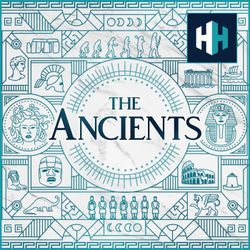
631. How to Write Cuneiform with Dr. Irving Finkel
01:00:21||Ep. 631More than 5,000 years ago, a revolutionary script emerged in the fertile lands of Mesopotamia that would transform how people counted, governed, worshipped and told stories. This was cuneiform, the world’s earliest known writing system.In this episode of The Ancients, Tristan Hughes is joined by Dr Irving Finkel to uncover how cuneiform actually worked and how you would write it yourself. From humble beginnings as simple pictograms tracking beer and grain, to the wedge-shaped signs that recorded myths, laws and epic tales long before the Bible, this episode explores how cuneiform spread across Sumer, Babylon, Assyria and Persia — and why these clay tablets remain one of archaeology’s richest windows into the ancient world.MORENoah's Ark and the FloodListen on AppleListen on Spotify The World's Oldest LettersListen on AppleListen on Spotify Watch this episode on our NEW YouTube channel: @TheAncientsPodcastPresented by Tristan Hughes. Audio editor is Aidan Lonergan. The producer is Joseph Knight. The senior producer is Anne-Marie Luff.All music courtesy of Epidemic SoundsThe Ancients is a History Hit podcast.Sign up to History Hit for hundreds of hours of original documentaries, with a new release every week. Sign up at https://www.historyhit.com/subscribe. You can take part in our listener survey here:https://insights.historyhit.com/history-hit-podcast-always-on